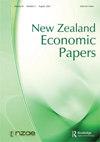2019冠状病毒病大流行期间的经济不安全:来自大衰退的见解
IF 0.7
Q3 ECONOMICS
引用次数: 1
摘要
本文使用最近开发的新西兰经济安全指数(ESI)来探讨COVID-19大流行对新西兰家庭的潜在影响。ESI是衡量经济不安全感的一种指标,它确定了易受同比收入负冲击影响的人口亚群体。ESI显示,不安全感与新西兰的商业周期密切相关,这可能会让政策制定者担心如何应对COVID-19大流行的影响。如果收入损失遵循全球金融危机(GFC)中观察到的模式,最容易受到收入负冲击的人口群体包括Pākehā、退休人员和教育程度较低的个人,而收入最高的五分之一家庭相对于中等收入家庭更能免受冲击。负收入风险是一个重要的经济压力源,很少被直接衡量。我们计算ESI的方法可以被新西兰统计局采用,并每年发布一次。本文章由计算机程序翻译,如有差异,请以英文原文为准。
Economic insecurity during the COVID-19 pandemic: insights from the Great Recession
This paper uses the recently developed New Zealand Economic Security Index (ESI) to explore the potential impacts of the COVID-19 pandemic on New Zealand households. The ESI is a measure of economic insecurity that identifies subgroups of the population that are susceptible to negative year-on-year income shocks. The ESI shows that insecurity closely follows the business cycle in New Zealand, which may concern policymakers tackling the effects of the COVID-19 pandemic. If income losses follow the pattern observed in the Global Financial Crisis (GFC), demographics groups most susceptible to negative income shocks include Pākehā, retirees and individuals with fewer educational qualifications, while households in the highest income quintile are more protected from shocks relative to middle income households. Exposure to negative income risk is an important economic stressor that is rarely measured directly. Our method of calculating the ESI could be adapted by Statistics New Zealand and published on an annual basis.
求助全文
通过发布文献求助,成功后即可免费获取论文全文。
去求助
来源期刊

New Zealand Economic Papers
Economics, Econometrics and Finance-Economics, Econometrics and Finance (all)
CiteScore
1.20
自引率
0.00%
发文量
17
 求助内容:
求助内容: 应助结果提醒方式:
应助结果提醒方式:


